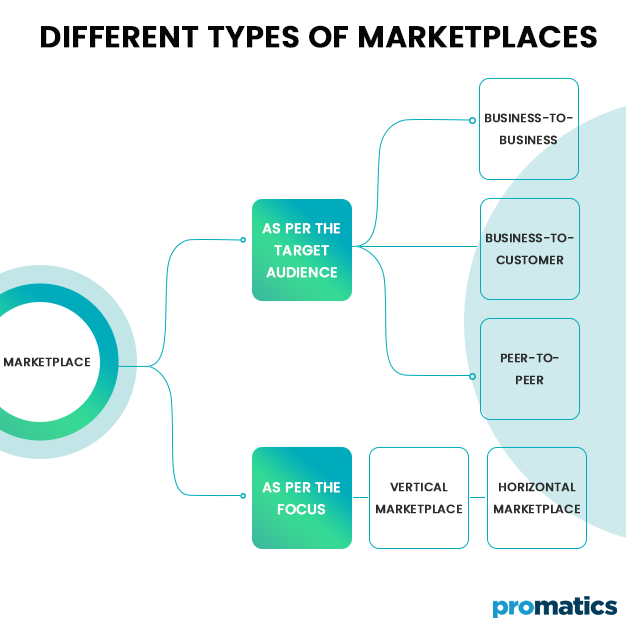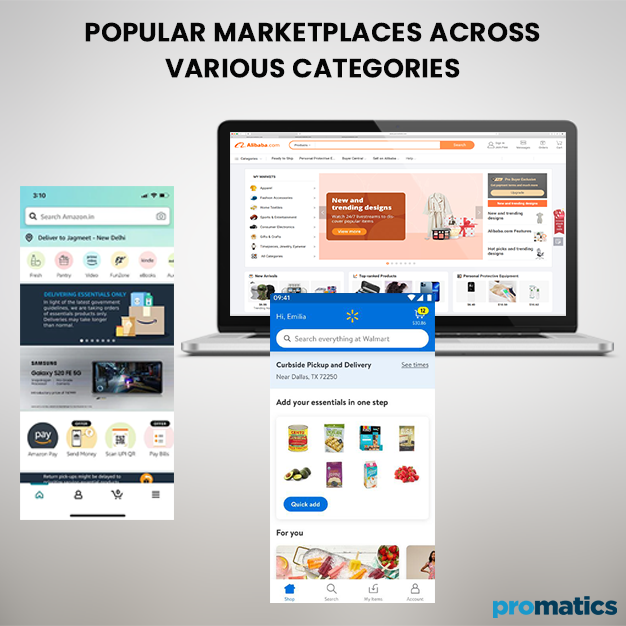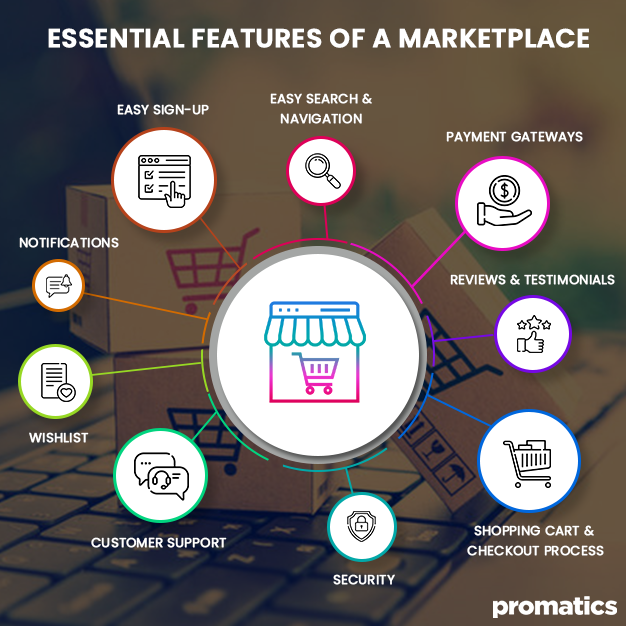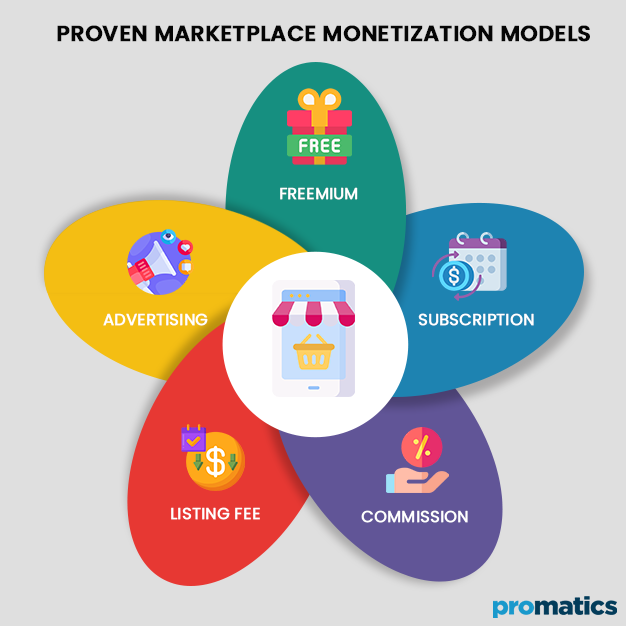What Entails Building a Marketplace Platform?
The rising number of online marketplace platforms has intrigued people. Following the hype, we will discuss how to build an online marketplace in this article.
With a surge in demand for online platforms, businesses have started transitioning to the digital world. Many people believe that online platforms are the future of businesses. Statistics show a tremendous increase in revenue generation of the e-commerce industry. About a third of marketing executives in the United States felt more dependent on Amazon during the pandemic in 2021. The E-commerce industry has made it easier for buyers and sellers to connect.
The most lucrative online platform has turned out to be online marketplace websites. It helps third-party sellers to offer their products to customers. An online marketplace offers them a platform to make sales and purchases. In this article, we will discuss how to build an online marketplace? What entails building a marketplace platform? So, you can understand the process if you want to create an online marketplace.
What Is a Marketplace?
After facing challenging times in the form of a pandemic, companies have understood the significance of digital platforms to upscale and expand their business. The demand for online marketplaces is skyrocketing as it has made buying and selling easier for both customers and vendors.
So, what is an online marketplace? A marketplace is a digital version of any physical store except the fact that various merchants can sell different products to customers directly. It is an independent online platform that connects buyers and sellers. However, an online marketplace platform should have certain special features to enhance its functionality and smooth operation.
Moreover, it’s easy to create an online marketplace, but you should consider some essential factors before making it. Here are some of them!
Define Your Idea
You need to present an idea for an online marketplace that has the potential to grow and expand. So, you need to ensure your idea has the possibility to gain users. Your marketplace should solve your audience’s pain point.
Define Your Audience
After researching the market, you need to choose your target audience. You have to define the buyer’s persona – who will use your website. For this, you can describe your audience’s:
Age
Location
Occupational level
Educational level
Family
Pain points
Yearly income
Interests and inspirations
Online marketplace platforms cater to both buyers and service providers. Depending on the marketplace you will build, you can add more features to target your potential audience. You can even describe your ideal service providers for the proper advertisement.
Types of Marketplaces
Online market platforms are generally categorized based on their target audience, business model, and focus. Let’s look at different types of marketplaces!
Types of Marketplaces As Per The Target Audience
Business-to-Business (B2B)
A business-to-business marketplace helps businesses expand their distribution. It facilitates businesses in connecting with other organizations. Organizations buy in bulk, which increases the order size and helps in generating more revenue. Its perfect example is Alibaba which is the biggest online B2B platform.
Peer-to-Peer (P2P)
Peer-to-peer (P2P) or customer-to-customer (C2C) marketplaces bring individuals together, where they can share their products and services with each other. It unites people with the same interests, and individuals can always switch their roles. A great example of P2P is Etsy, where people can sell their handmade products.
Business-to-Customer (B2C)
A B2C marketplace is an online platform that connects businesses with direct consumers. At such platforms, customers can find the products retailers offer and buy as per their choice. Sellers can also build a niche-specific market within this model. Currently, Amazon, eBay, and AliExpress are the most popular B2C models.
Types of Marketplaces As Per The Focus
Vertical Marketplace
A vertical marketplace serves customers with specific needs and preferences. It only targets one type of audience and focuses on the specified niche. This business model allows retailers to focus on their service quality. An excellent example of a vertical marketplace is Etsy, which deals in vintage and handmade goods. However, it is crucial to do proper research to choose a niche.
Horizontal Marketplace
A horizontal marketplace offers various products from different retailers at once. You can consider it similar to an online store that fulfills various needs of consumers. It facilitates gaining an audience to a broader level, which helps in generating more revenue. However, retailers need to stand out among their competition through marketing at horizontal marketplaces. A great example of a horizontal marketplace is Amazon and AliExpress.
Popular Marketplaces Across Various Categories
The next important point in how to build an online marketplace would be to study different marketplaces. The more you know about the best online market platforms, the more you will learn!
i.) Amazon
Amazon has revolutionized the concept of an online marketplace. It is known to be one of the best marketplace websites and the most sought marketplace for shoppers. It offers a full range of goods, including books, toys, electronics, collectible art, and many other items from various sellers around the globe.
Sellers can immediately start selling through Amazon’s individual selling plan. However, they might need to seek permission or apply for a professional plan for specific niches. Amazon has proven itself to be a goldmine for sellers and retailers as consumers spend more than $1400 a year, on average, on Amazon.
ii.) eBay
Sellers who want to tap into the most prominent online marketplace platform go for eBay. eBay has a vast global market share, and it operates in more than 190 markets across the world. It functions as the consume-to-consumer and business-to-consumer marketplace. Its unique features like online auctions to sell collectibles stand it apart.
iii.) Alibaba
Alibaba is one of the largest online market platforms for retailers and eCommerce businesses. The company hosts all the B2B, C2C, and B2C marketplaces. Primarily, Alibaba is a B2B website and offers a variety of products to consumers. It’s your go-to platform for products that are produced in mass production and sold wholesale.
iv.) Etsy
Etsy is famous for selling handmade products and vintage items. This marketplace is suitable for vintage shops as well as artists, crafters, and collectors. It is a global online marketplace where buyers find creative and unique items. Its primary focus is on enhancing the aesthetic appeal of the products to compel the buyers. Due to its unique idea, Etsy is one of the highest revenue-generating platforms.
v.) Walmart
Walmart is an invite-only platform that customers visit itself. Also, Walmart operates on commission fees only. Its affiliate websites like jet.com are another channel that helps sellers. Almost 240 million customers visit the Walmart store each week around the world. Walmart offers affordable products to customers in a wide range.
vi.) Bonanza
Bonanza is another online market platform that used to deal in collectibles and vintage items in the beginning. With time, it increased its products and started offering various items. Currently, Bonanza is one of the most sought out marketplaces with over 5 million visitors each month.
Important Features of A Marketplace
Marketplace websites must have some significant features that stand them apart from their competition. It’s an integral part of the process of how to create an online marketplace website. Let’s look at some of the outstanding features that enhance the functionality of a marketplace website.
1.) Easy Sign-Up Process
The signing-up process should be easy for both the vendors and customers. So that helps in completing the process in minimal time with simple steps. It aids in gaining more sellers and users as people like ease. If the process is complex or difficult to understand, people will immediately get discouraged and switch it.
Thus, the process to make a profile or user account should be straightforward and short. You can also offer them a sign-up option via their social media channels like Twitter, Facebook, or Google. After signing up, setting up the account should also be comprehensible.
2.) Easy Search And Navigation
For building an online marketplace that sells and generates revenue, it is crucial to have a powerful search option. Buyers can search for a product in different ways; thus, you should build a search system that filters out products in a wide range. The navigation through the website should be easy and straightforward for the customers. If buyers can’t find what they are searching for, they will most likely leave your marketplace platform.
Your products should be organized and categorized according to prices, brands, sizes, and other options. So, the customers can navigate through it quickly and find the product of their choice.
3.) Payment Gateways
The best online marketplace platform offers various payment systems to facilitate consumers. Selecting all those online payment systems compatible with online platforms is crucial. Moreover, the payments should be secure; it’s the most significant feature when making an online marketplace. Lack of payment options can cause friction with the customers. To make your customers’ life easy, choose options that promote a smooth transaction. You can include PayPal, Google Pay, Stripe, and bank transfers.
4.) Reviews And Testimonials
The reviews section is another important feature for an online marketplace website. The ratings and testimonials by the users play a significant role and impact sales directly. Mainly, people check the reviews of their desired product before purchasing it. So, you should also include a feedback system on your marketplace where users can leave their reviews.
Helpful feedback has the potential to turn visitors into potential buyers. Reviews and testimonials help in gaining trust and building credibility. Also, it’s a great way to build customer satisfaction.
5.) Security
You must ensure the security of your online marketplace website for both buyers and merchants. When one places their information online, they need assurance regarding privacy and confidentiality. All the eCommerce sites should possess an SSL certificate and pass PCI compliance. So, take care of it during the development process of your website for data confidentiality.
6.) Shopping Cart And Checkout Process
Many online marketplaces include shopping carts as their essential feature. Customers can add all the items or products they like and review them at the end for the final checkout. Further, the checkout process should also be easy and free of hassles. So, people can make purchases without going through various processes.
7.) Customer Support
Real-time and 24/7 available customer support are essential for customer satisfaction. It helps in improving business and enhancing your website’s efficiency. A chatbot must be included in your website’s features where customers can place their queries and get answers in real-time.
8.) Wishlist
A wishlist is another online marketplace website’s feature that allows buyers to add their favorite items in one place. A wishlist gives buyers an opportunity to remember the products they would like to buy. They can create a collection of their desired items and save them from purchasing in the future. This feature also hints towards the buyer’s interest in specific goods.
9.) Notifications
Notifications are an important feature for both vendors and buyers. It alerts the customers of any new deal or special discounts. So, they can get attracted to the sales and make purchases.
Definitive Marketplace Monetization Models
To work on how to build an online marketplace platform, you need to choose a monetization model for the marketplace. There are several financial strategies that businesses can use.
A.) Freemium
In this monetization model, many features are free, and the premium ones are paid. It requires monetization to offer additional features.
b.) Subscription
The users have to pay a monthly or yearly fee to use the marketplace. It gives them access to some premium and advanced features.
C.) Commission
The marketplace charges a fixed amount or percentage for every successful transaction through the marketplace. This strategy is most popular among the various largest online marketplace platforms like eBay and Etsy.
D.) Listing Fee
Sellers have to pay a fee for every listing they create at the marketplace. The more listings they have, the more they can sell and generate profit.
E.) Advertising
Marketplaces offer paid promotions to sellers to promote their products and place them higher in searches. The more users a marketplace has, the more it can earn through advertisement.
The Next Steps
Once you have worked out all the strategies mentioned above and models for your marketplace platform, you will have to deal with the technical development process. The technical part includes setting up your website. You will have to create a wireframe of the structure of your online marketplace website. This process includes designing a UX/UI design of the marketplace website. Then, a prototype is developed of the website to test it. It defines the user interaction with your website. You can create a highly customizable and easy-to-navigate website for a great user experience.
Final Words
Developing an online marketplace platform is a comprehensive and extensive process. It entails going through proper research, structure, and developmental phases. You have the choice to outsource it to an offshore development company that knows how to build an online marketplace platform. However, you need to collaborate to decide the factors that make your marketplace unique. With the right marketplace development plan, you can create an online marketplace that grows your business.
Still have your concerns?
Your concerns are legit, and we know how to deal with them. Hook us up for a discussion, no strings attached, and we will show how we can add value to your operations!




